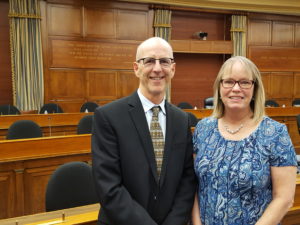Third round of grants awarded for the development of commercially promising biomedical innovations
The Center for Biotechnology at Stony Brook University, on behalf of the Long Island Bioscience Hub (LIBH), announced the recipients of the third round of funded projects under the Hub’s technology development and commercialization initiative. Funding for ten projects totaling $550,000 has been awarded to applicants from the Hub’s partner institutions. Partner institutions include Stony Brook University, Cold Spring Harbor Laboratory, Brookhaven National Laboratory, and the Feinstein Institute for Medical Research at Northwell Health. Eighteen months after its establishment, the LIBH has already awarded more than $2M to faculty innovators.
The technology development awards made available by the LIBH are specifically aimed at growing a pipeline of commercially promising biomedical technologies that can be out-licensed for further development or serve as the foundation for new company formations in the region. There are two tiers of funding, each with the goal of accelerating technology development to reach a critical development inflection point. Feasibility awards ($50,000) are designed to rapidly test the feasibility of new ideas in a “fail-fast-or-proceed” format, or to add value to existing intellectual property leading to new market applications. Proof-of-Concept Awards ($100,000) provide targeted, milestone driven support for further development, testing, and analysis of existing intellectual property.
A wide range of disciplines are represented in the project awards this cycle including radiology, quantitative biology, biomedical engineering, chemistry, neurosurgery and cancer research. Nine Feasibility awards and one Proof of Concepts award have been funded this cycle. Projects awarded funding in this round include the development of radiotracers for use with PET scans to detect bacterial infections, specifically infective endocarditis (IE); a non-immune-based drug targeting amyloid ß-protein (Aß) for the treatment of mild Alzheimer’s disease; DNA nano-carrier platform technology for targeted anti-thrombotic drug delivery in prosthetic heart valve and mechanical circulatory support patients; A medical device utilizing electrical and software engineering in order to detect congenital heart disease in newborn children, and profiling the human immune system through machine learning and bioinformatics. The full list of funded projects can be found on the LIBH webpage.
“The latest announcement of funded project for the LIBH demonstrates the volume of innovation housed within partner institutes that is primed to be moved out of the academic lab and into the commercial sector in order to help patients” said Clinton T. Rubin, Ph.D., Distinguished Professor, Chair, Department of Biomedical Engineering, and Director, Center for Biotechnology. “It is exciting to witness our region’s innovators contemplating their research in ways they hadn’t before, and to see the vibrancy of the bioscience cluster on Long Island growing with each new project proposed.”
“Putting CSHL scientists together with HUB biotech entrepreneurs and industry reviewers is key to the successful translation of early stage ideas resulting from the basic research of Dr. Lingbo Zhang and Mickey Atwal, said Teri Willey, CSHL Vice President Business Development and Technology Transfer. “Zhang’s genetic research on myelodysplastic syndrome will be complimented by experience in medicinal chemistry. Similarly, Atwal’s work on developing therapeutics using physics and math to profile to the immune system will benefit from industry reviewers to guide it toward patient benefit.”
“The success of the Long Island Bioscience Hub demonstrates the value of creative partnerships in bringing medical solutions that help address patients’ needs from the research lab to the doctor’s office and the medical clinic. We are proud to be part of the Bioscience Hub’s success,” said Kevin J. Tracey, M.D., President and CEO of the Feinstein Institute.
The main goal of the LIBH is to foster the development of therapeutics, preventatives, diagnostics, devices and research tools emerging from LIBH partner institutions that address diseases within the NIH’s mission.
Download a PDF of the press release here.
